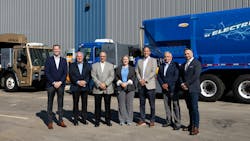MADISON, Wisconsin—The City of Madison officially received two Mack LR Electric Class 8 refuse trucks during an event on Sept. 17. The city’s LR Electric trucks are the first fully electric refuse trucks in Wisconsin.
Madison received a copper-colored LR Electric with a Leach rear-loader and a blue-colored LR Electric with a Labrie Automated Side Loader. The city demonstrated the ASL in action.
Madison replaced two outgoing ICE refuse trucks with two new LR Electric models. The reasons to purchase an EV, according to the city’s mayor, are many—ranging from improved air quality to reduced operational costs.
“One of the reasons that we’re going all in on electrification is because it’s better for the environment and mostly because it’s better for our air quality,” Mayor Rhodes-Conway said. “Government never does things for just one reason; it’s also a win for our budget ... It’s reduced maintenance for our fleets, and that saves us in terms of parts, in terms of labor. It's also reduced fuel costs.”
George Fotopoulos, Mack’s VP of E-mobility, expanded on these EV benefits.
“The introduction of these electric vehicles is not just about replacing old trucks with new trucks. It’s embarking in a new era of waste management,” Fotopoulos said. “These vehicles offer real-world benefits. They’re more efficient. They’re quieter. They’re safer. They have lower emissions, which means they’re also healthier for the communities that they serve. The future of transportation in waste is actually here today with these two vehicles behind us.”
The City of Madison aims to reach net zero emissions by 2030, which will drive the city to reach other electrification milestones. In 2021, the city’s fire department was the first in North America to operate an electric fire truck, the Pierce Voltera, under real emergency response conditions.
“In addition to these heavy-duty vehicles, we have more than 100 fully electric light-duty vehicles,” Mayor Rhodes-Conway said. “We have about 150 hybrids, and we have 62 new fully electric buses, which are going into service on the 22nd in our new bus route.”
Electric truck population to continue growing
As ICE fleet vehicles reach the end of their lives, city fleets will likely continue growing their BEV count. Madison’s mayor said that the city chose to purchase these EVs at the end of earlier trucks’ life cycles.
“We have to shift our fleet anyway; these vehicles have a life cycle,” Rhodes-Conway said. “We buy new vehicles all the time, and we are constantly interested in buying the best vehicles for our community.”
The duty cycle involved in municipal operations like refuse collection fit well with BEVs’ range and charging needs. If EV battery capacity continues to grow, grid capacity continues to improve, and EV maintenance costs fall below diesel maintenance costs, the case for municipal EV fleets will only grow.
And, as city fleets grow their BEV count, OEMs are poised to offer a greater range of BEVs. Bollinger just started production for its Bollinger B4 Chassis Cab. During May’s Advanced Clean Transportation Expo, several OEMs showed off new EVs for North America, including Daimler Truck, Hino, Lion Electric, TICO Manufacturing, and Blue Bird Corporation.
See also: The road to becoming an OEM
LR electric is Mack Trucks’ first electric truck, launched in 2021 and based off the LR’s diesel and natural gas platforms. Mack began production on its second electric truck, the MD Electric, in March. The brand plans to further expand its offering of electric trucks.
“We will continue to launch more electric truck models,” Mack’s Fotopoulos said at the event. “Eventually, of course, to make more efficient trucks, but also to transition our fleet to a fully zero-emission truck fleet.”








